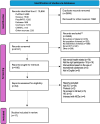Effectiveness of psychological crisis interventions during infectious disease outbreaks in low- and middle-income countries: a systematic review of Randomized Control Trials
- PMID: 40303959
- PMCID: PMC12037349
- DOI: 10.1017/gmh.2025.22
Effectiveness of psychological crisis interventions during infectious disease outbreaks in low- and middle-income countries: a systematic review of Randomized Control Trials
Abstract
The huge mental health treatment gap in low- and middle-income countries (LMICs) is further exacerbated when infectious disease outbreaks occur. To address the increasing mental health needs during outbreaks, the availability of flexible and efficient mental health interventions is paramount, especially in low-resource settings where outbreaks are more common. Psychological interventions may help to address these mental health needs with efficient implementation costs. However, there is a huge paucity of quality evidence to inform psychosocial interventions during outbreaks. This systematic review sought to update the existing evidence to inform the effectiveness of psychological interventions that addresses mental health issues during outbreaks in LMICs. Six electronic databases were searched - Scopus, PubMed, PsycINFO, Embase, Cochrane library and CINAHL. We included randomised controlled trials of psychological interventions aimed to address common mental health conditions among adults affected by infectious disease outbreaks in LMICs. Studies were excluded if they were done among all age groups, used mixed interventions with pharmacotherapies, addressed severe mental health conditions and were published other than in English. The quality of evidence in the included trials was assessed using the Cochrane Collaboration risk of bias tool. We included 17 trials that examined the effectiveness of psychological interventions among outbreak-affected adults in LMICs. The quality of studies was generally average but tended to provide evidence that brief psychoeducational interventions based on cognitive restructuring, mindfulness, relaxation and stress management techniques were effective in reducing perceived stress and anxiety symptoms, and in improving resilience and self-efficacy. Similarly, mindfulness-based interventions and mindfulness stress reduction treatments were effective in addressing depression, anxiety and generalised anxiety disorder. Brief psychological interventions that can be delivered by non-specialists could have value in addressing the huge mental health needs in outbreak contexts.
Keywords: anxiety; depression; disease outbreaks; mental health; psychotherapy.
© The Author(s) 2025.
Conflict of interest statement
The authors declare that they have no conflict of interest.
Figures
References
-
- Alkhawaldeh J (2023) Psychoeducational interventional programme during the COVID-19 pandemic for nurses with severe occupational stress: A randomized controlled trial. International Journal of Nursing Practice 29, e13129. - PubMed
-
- Arenliu A, Uka F and Weine S (2020) Building online and telephone psychological first aid services in a low resource setting during COVID-19: The case of Kosovo. Psychiatria Danubina 32, 570–576. - PubMed
-
- Cuijpers P (2024) How to improve outcomes of psychological treatment of depression: Lessons from “next-level” meta-analytic research. American Psychologist 79, 1407–1417. - PubMed
Publication types
LinkOut - more resources
Full Text Sources
Miscellaneous



